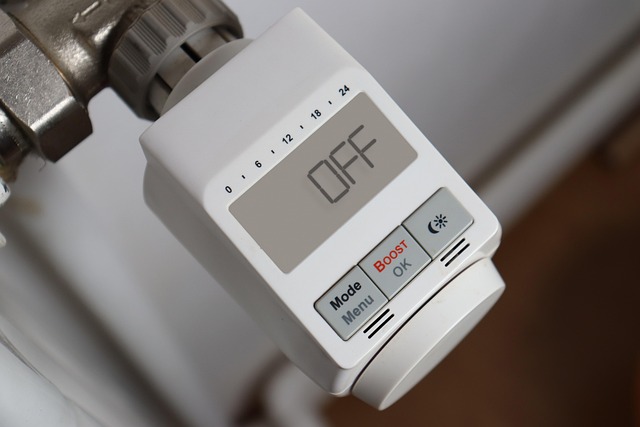Hybrid gas water heaters combine traditional gas technology with solar thermal systems, offering enhanced energy efficiency and cost savings for environmentally conscious homeowners. These systems use both natural gas and solar energy to provide reliable hot water, reducing reliance on conventional energy sources. By integrating instant heat convenience with cost-saving, eco-friendly solar power, hybrid heaters minimize energy consumption during peak sunlight hours, lowering utility bills and contributing to a cleaner environment. While initial costs are higher, long-term savings on energy bills make them an attractive choice for efficient hot water solutions.
Hybrid gas water heaters, combining conventional gas power with solar thermal technology, offer an efficient, cost-effective heating solution. This article explores the symbiotic relationship between these two systems, highlighting their mutual benefits for both residential and commercial applications. By harnessing solar energy, hybrid heaters reduce reliance on fossil fuels, offering significant savings and environmental advantages. We’ll delve into the mechanics, benefits, and practical considerations for installing and maintaining these innovative hybrid gas water heater setups.
- Understanding Hybrid Gas Water Heaters and Solar Thermal Systems
- Benefits of Integrating Gas Water Heaters with Solar Thermal Technology
- Installation, Maintenance, and Cost Considerations for Hybrid Systems
Understanding Hybrid Gas Water Heaters and Solar Thermal Systems

Hybrid gas water heaters are a cutting-edge solution that combines traditional gas technology with renewable energy sources like solar thermal systems. This innovative approach to residential water heating offers significant advantages in terms of energy efficiency and cost savings, making it an attractive option for environmentally conscious homeowners. By harnessing the power of both natural gas and solar energy, these hybrid systems provide reliable hot water while minimizing the environmental impact.
Solar thermal systems, on the other hand, utilize the sun’s energy to heat water through a process that involves collecting sunlight and transferring its heat to a fluid. This heated fluid is then used to warm water in a tank or, in some cases, directly supply hot water to fixtures. Integrating solar technology with gas water heaters allows for efficient water heating, even on cloudy days or during periods of low sunlight, thanks to the backup provided by gas-fired heaters. This combination not only reduces the reliance on conventional energy sources but also contributes to a more sustainable and eco-friendly home.
Benefits of Integrating Gas Water Heaters with Solar Thermal Technology

Integrating a hybrid gas water heater with solar thermal technology offers numerous benefits for both residential and commercial hot water systems. By combining conventional gas water heating with renewable solar energy, users can significantly enhance their energy efficiency and reduce environmental impact. This approach leverages the advantages of both technologies: the instant heat and convenience of gas fired heaters, and the cost-saving, eco-friendly nature of solar thermal systems.
For instance, tankless gas systems or tank water heaters equipped with solar panels can provide consistent hot water while minimizing energy consumption. During peak sunlight hours, solar thermal technology can meet a substantial portion of the hot water demand, thereby reducing reliance on natural gas heaters or propane water heaters. This not only lowers utility bills but also contributes to a cleaner environment, making it a smart choice for those looking to adopt more sustainable practices in their home or business’s residential water heating solutions.
Installation, Maintenance, and Cost Considerations for Hybrid Systems

The installation of hybrid gas water heater and solar thermal systems requires careful planning and professional expertise. This process involves integrating the gas water heater with a solar energy collection system, ensuring efficient heat transfer and optimal performance. Once installed, regular maintenance is crucial to sustain efficiency and prolong the lifespan of both components. This includes periodic inspections, cleaning, and adjustments specific to each system’s needs.
Cost considerations for hybrid systems are multifaceted. While initial installation costs may be higher compared to conventional gas water heaters or tankless systems, long-term savings on energy bills make up for it. The integration of solar thermal technology allows for significant reductions in residential water heating expenses, contributing to a more energy-efficient home and lower environmental impact. Moreover, rebates and incentives from local utilities or governments can further offset the upfront investment, making hybrid gas water heaters a compelling choice for those seeking efficient and sustainable hot water systems.
Hybrid gas water heaters paired with solar thermal systems offer an efficient and sustainable solution for heating water. By combining conventional gas power with renewable solar energy, these systems provide significant benefits, including reduced energy costs and a smaller carbon footprint. While installation and maintenance considerations exist, the long-term savings and environmental advantages make hybrid systems an attractive option for homeowners looking to integrate green technology into their homes.
